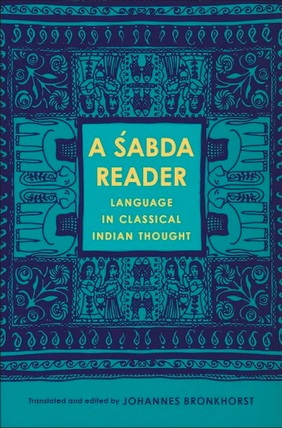Language (śabda) occupied a central yet often unacknowledged place in classical Indian philosophical thought. Foundational thinkers considered topics such as the nature of language, its relationship to reality, the nature and existence of linguistic units and their capacity to convey meaning, and the role of language in the interpretation of sacred writings. The first reader on language in—and the language of—classical Indian philosophy, A Śabda Reader offers a comprehensive and pedagogically valuable treatment of this topic and its importance to Indian philosophical thought.
A Śabda Reader brings together newly translated passages by authors from a variety of traditions—Brahmin, Buddhist, Jaina—representing a number of schools of thought. It illuminates issues such as how Brahmanical thinkers understood the Veda and conceived of Sanskrit; how Buddhist thinkers came to assign importance to language’s link to phenomenal reality; how Jains saw language as strictly material; the possibility of self-contradictory sentences; and how words affect thought. Throughout, the volume shows that linguistic presuppositions and implicit notions about language often play as significant a role as explicit ideas and formal theories. Including an introduction that places the texts and ideas in their historical and cultural context, A Śabda Reader sheds light on a crucial aspect of classical Indian thought and in so doing deepens our understanding of the philosophy of language.
- Table of Contents
- Part I. Introduction
- General Observations About Philosophy in India
- 1. The Brahmanical Background
- 2. Buddhist Thought: Source of Inspiration
- 3. The Grammarian Patanjali
- 4. The Special Place of Sanskrit and the Veda
- 5. Self-Contradictory Sentences
- 6. Do Words Affect Cognition?
- 7. Words and Sentences
- 8. Other Denotative Functions of the Word
- Part II. Reader
- 1. The Brahmanical Background
- 2. Buddhist Thought: Source of Inspiration
- 3. The Grammarian Patanjali
- 4. The Special Place of Sanskrit and the Veda
- 5. Self-Contradictory Sentences
- 6. Do Words Affect Cognition?
- 7. Words and Sentences
- 8. Other Denotative Functions of the Word
- Index of Translated Passages
- The Texts and Their Dates
- Chronological Table of Authors and Works
- Editions Used
- Technical Terms and Their Equivalents in English
- Abbreviations
- Notes
- References
- Index

